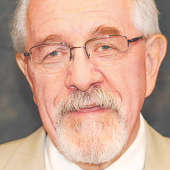- Christmas shopping is done, presents wrapped, strings attached? (12/14/16)
- Cecil is dead and human lives are threatened every day (8/12/15)
- As state flags go, Nebraska's ranks 50th (7/8/15)
- When everything looks like a nail (4/29/15)
- Who remembers to coal slurry pipeline debate? (3/11/15)
- More revelations in Department of Corrections mess (12/17/14)
- The Legislature becomes more Republican (11/19/14)
Opinion
Heineman tax plan: Legacy or folly?
Wednesday, January 30, 2013
Given the propensity of politicians and pundits to refer to the Syracuse Tax Study of 1987, it is obvious that Nebraska's tax policy needs to be revamped ... or at least revisited.
Plans announced by lame duck Governor Dave Heineman -- who wants to eliminate the state income tax -- could easily begin the discussion. The problem with eliminating the tax, a move that Heineman says will spur the growth of business, is that a couple billion dollars of lost revenue will need to be replaced. The governor wants to remove some sales tax exemptions to make up the difference in a move that will seemingly penalize agriculture (farm machinery, energy and water), hospitals (tax on medicine and rooms) and college students (tax on dormitory rooms).
A group called the OpenSky Policy Institute brought one of the nation's leading tax policy experts to Lincoln recently. Dr. Richard Pomp, a University of Connecticut professor, says the process by which Nebraska tax reform should occur needs to be careful and well thought-out. Specifically, it needs to be researched and it should not be hurried. "It certainly isn't something that should be completed in a single legislative session," he cautions.
Renee Fry, executive director of the OpenSky Policy Institute, calls for a complete and thorough inventory of Nebraska's tax system to ensure it is the best code for all Nebraskans. Pomp adds that Heineman's call for the disposal of the state income tax is NOT backed by "substantial empirical evidence" indicating that it has the potential to attract businesses and jobs to Nebraska.
The state could recoup the more than $2 billion it would lose in income tax revenue if it eliminated many of its sales tax exemptions, Heineman said in his annual State of the State address to lawmakers and in subsequent press availability in two days of a statewide fly-around. His comments seemed to perplex the chairman of the Legislature's Agriculture Committee, Sen. Ken Schilz of Ogallala. And rightly so, given the battles that ag producers have faced with lawmakers and governors for years. In the midst of a drought, it doesn't seem to make sense to tax farmers for water and the energy used to get that water to the crops.
The struggle to shape state tax policy in the courts reached a peak in the early Nineties when the state Supreme Court forced lawmakers into three special sessions in one interim to address the way it taxes railroads, pipelines and farm machinery. State senators and the general public learned the meaning of the federal 4-R Act (Railroad Revitalization and Regulatory Reform), which prohibits the taxing of railroad property in a discriminatory manner. Gov. Ben Nelson created the 3-R Committee (Revenue, Restructuring and Revitalization Committee), which was charged with developing a long-term solution to Nebraska's personal property tax crisis.
True, the issues centered on personal property tax, not the income tax. But they were part of the tax structure. And, they weren't as sweeping as the bold tax move of Governor Norbert Thiemann who pushed for and oversaw implementation of the state sales tax, a move that cost him re-election in 1970 when he was defeated by Lincoln businessman J.J. Exon who was making his first bid for public office.
So now we are left to question whether Heineman's suggestion to bag the personal income tax is a bold bid for a Thiemann -- like legacy or just simply folly.
Heineman is term--limited as governor and has been all but ruled out as ever being a potential candidate for the U.S. Senate.
If his suggestion starts the much-needed dialogue on a contentious and difficult topic, he'll earn an asterisk in the Nebraska Blue Book for his efforts. If he pushes it with a bigger hammer through a 90-day session in an effort to just get his way, he'll be not so fondly remembered otherwise.

